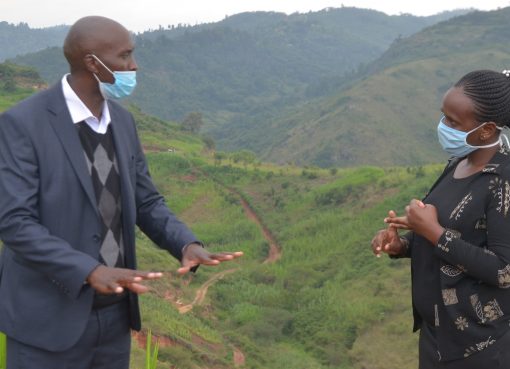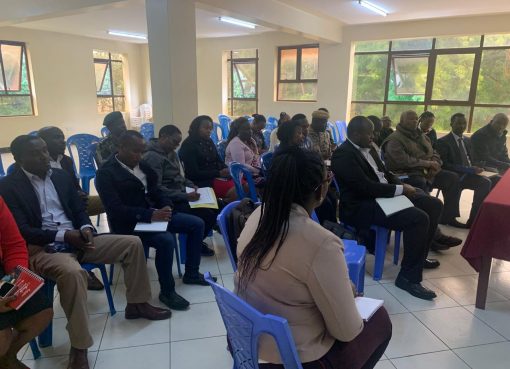Mama Selina Kiplagat, a resident of the arid Kerio Valley was all set for this year’s planting season following the onset of the long rains to ensure that she has adequate food for her children. This is because the dry season becomes a nightmare for mothers in the area due to lack of food leading to malnutrition.
A mother of six, Mrs. Kiplagat is one of those chosen by the World Vision International to receive enriched beans and orange sweet potatoes, rich in zinc and iron meant to address stunted growth among children aged between 0-5 years, which stands at 30% in Elgeyo Marakwet county, against an average of 19% nationally.
These being new crops, farmers like Mrs. Kiplagat require adequate training to ensure that they get it right.
`
But just as she was about to embark on planting, the covid-19 pandemic hit the country, compelling the government to put in place strict measures to contain the spread of the virus.
One of the measures is social distancing, meaning that it would be impossible to assemble farmers in one place and train them.
However, according to the Manager World Vision Elgeyo Marakwet county, Moses Kiptugen, the organization had just put in place a new concept which came in handy.
Kiptugen said as the organization was ending its financial year in October last year, they realized that they were facing challenges of carrying out extension services due to a biting shortage of extension officers from the department of agriculture which they partner with for the services.
The organization decided to approach the communities in the Kerio Valley on what to do to address the crisis and that is how they came up with the concept of a lead farmer.
“We operate in 11 wards in the Kerio Valley and through the communities we came up with 260 lead farmers who will in turn train and supervise 30,000 households,” Kiptugen said.
All the lead farmer farmers went through an in-depth training by the department of agriculture which was facilitated by World Vision to supplement extension services.
Kiptugen said working with the Kenya Agriculture and Livestock Research Organization (KALRO) they have distributed the first batch of 30 tons of enriched beans to 15,000 farmers with each farmer getting 2kg for this planting season.
“We were also introducing orange sweet potatoes which are rich in vitamin A therefore vital in fighting malnutrition, which leads to stunted growth a situation which is irreversible,” he said.
The Manager said initially they were undertaking programs in the education sector and that was when they realized there was a problem of stunted growth in the area and therefore they had to intervene through agriculture to improve their health.
A lead farmer in charge of Kaplis village in Tambach ward, Diana Kibet says she is the link between World Vision and the farmers.
“I collect seeds from World Vision and not only distribute to farmers but I also have to ensure that they plant them according to the guidelines set,” she said.
She however, says the heavy rains that are currently pounding the area have dealt a blow to the beans which were planted about two weeks ago saying some are yet to germinate due to flooding of the farms. The problem has been compounded by the waters flowing from the highlands to the valley.
When KNA visited the area Monday, she was collecting sweet potato vines for distribution and as we realized the job is not for the faint hearted especially given that lead farmers are volunteers and therefore they do not receive any wages for their services.
The heavy rains have not only flooded farms but have also cut off roads with the raging waters flowing from the highlands causing huge gullies. This means that in most places she has to walk carrying her luggage on logs to cross over the waters because even motor bikes cannot be used.
“I take 2-3 days to distribute the seeds to all farmers under my care as the farms are scattered and I have to walk to most of the farms,” she said.
The Ward agricultural officer, Lydia Chemno says apart from providing important nutrients, the beans and sweet potatoes are highly productive and do especially well in arid areas. However, she advises farmers to ensure they consume and store for their families and only sell the surplus.
She added that for the surplus there was a huge market especially for sweet potatoes in hotels within and without as people become more conscious of healthy eating.
Meanwhile, Kiptugen has hailed the role played by the lead farmers in ensuring the uptake of the new crops saying this would have been impossible if they would have used the traditional approach of congregating farmers for training in the covid-19 era.
“The lead farmer is able to visit and give instructions to farmers each in their own homes, thus maintaining social distancing.
The Manager says the high poverty levels in the Kerio Valley correlates with the high cases of malnutrition as people sell whatever they have produced to meet their financial needs.
Kiptugen says a strong immunity is key in keeping at bay various diseases and therefore the importance of undertaking such interventions during the pandemic period to ensure such vulnerable people remain healthy.
“Both the crops are rich in vitamin A and boost zinc and iron in pregnant mothers and children under two years, thus laying a healthy foundation for the future generation,” he said.
He added that health and agriculture which are part of the president’s main four agenda are interrelated and therefore the organization is also doing its part in the contribution to the overall national development.
By Alice Wanjiru





